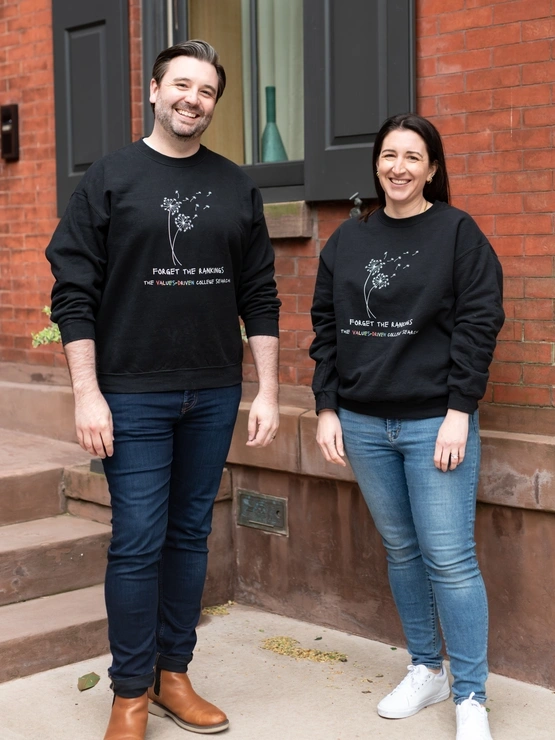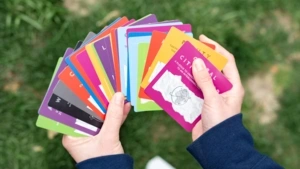In suburban Philadelphia, high school counselors Jared Epler and Jen Vallieres noticed a critical gap in the college search process: students struggled to identify schools that truly aligned with their values.

That’s where the Penn GSE alum Epler (M.S.Ed.’14) and Vallieres (M.S.Ed.’13) stepped up to help. The pair, licensed professional counselors and certified K–12 school counselors, founded Forget the Rankings, a new college information venture designed to move beyond college rankings and reputations.
Instead, their program helps families and counselors guide students toward schools that reflect their values and priorities, aiming for better academic and personal outcomes.
“We are trying to change the narrative around college admissions, think about health and wellness, and how to be happy in college and beyond,” said Epler, who is also an adjunct professor at Penn GSE.
“It should be a joyous process; students are worth so much more than an acceptance letter,” Vallieres added.
Epler and Vallieres, who met working at Lower Merion High School in Ardmore, said most students they meet are attracted to prestigious institutions and sports powerhouses, drawn in by reputation, slick marketing materials, and polished social media. Yet few can articulate why a particular college fits their goals or priorities.
But Forget the Rankings isn’t a typical college counseling service. They developed a detailed process to help students identify schools that align with their values, complete with a digital workbook that helps students and parents determine said values and criteria.
Students and their caregivers then complete two card-sorting activities — yes, paper cards — intentionally designed for Gen Z teens. “We wanted a tactile piece away from technology,” Epler said. “It facilitates organic, authentic discussion and gets students and parents or guardians talking.”
The first set of cards helps prioritize essential criteria, such as cost, location, size, athletics, Greek life, and demographics. The second set focuses on 26 key values: environmentalism, activism, fun, great food, curiosity, and more. Each card features a QR code linking to curated school profiles, with up to 15 per value, helping students connect their values to actionable college options. If a student’s ideal school isn’t featured, the activity helps them clarify what matters and build a college list.
The subscription-based service is available to families ($26.99 per month) and school counselors ($31.99 per month). Currently, Forget the Rankings is used in several Philadelphia-area schools, a national network of 25 charter schools, and even a school in Qatar. Vallieres said they’re focused on expanding to more schools.
Epler and Vallieres draw on their combined 30 years of professional and personal experience, noting that the program would have been invaluable during their college searches.
As a high schooler in rural Pennsylvania, where only about a third of students attended college, Epler relied on his mother and brother to help him identify small liberal arts schools. Meanwhile, in suburban Philadelphia, Vallieres felt pressured to apply to prestigious schools and was disappointed by rejections — despite robust support from her parents and school counselor.
“Your sweatshirt was your whole identity,” she said, referencing the college/university-branded attire students would wear to show off the school they planned to attend.
While she enjoyed a positive college experience, Vallieres said her pathway would have looked different if she had the tools she does now.
Forget the Rankings grew from a card activity Epler initially developed for his Penn GSE students to explore career options. In January 2024, Vallieres, frustrated after several meetings with students fixated on high-profile schools, shared her concerns with Epler. It sparked an idea.
“She said, ‘What if something existed to connect students with colleges rooted in their core values?’” Epler recalled.
They quickly designed a rudimentary set of cards, printing and laminating them at home. The students’ response was overwhelmingly positive, prompting the pair to launch their venture. They hired a professional printer, built a website, and added a QR code to each card. Vallieres even learned to code.
Once students establish their priorities and build a college list, the service offers additional resources, including scholarship opportunities, essay tips, and questions for tour guides and admissions representatives. Future features will include resources on gap years, study abroad programs, and a card-sorting activity for brainstorming impactful essays.
Epler and Vallieres say multiple Penn GSE faculty members, including Marsha Richardson, senior lecturer and director of the School and Mental Health Counseling Program, and Adjunct Professor Jeanne Stanley, have offered vital support and feedback.
“There is a powerful community of support at Penn GSE; they nurture your creativity,” Epler said. “I never thought I’d be texting with my professors 10 years later.”
As they build the company, the pair remain committed public school counselors. Their ongoing work in schools gives them first-hand insight into the challenges students, families, and counselors face.
“This service is made by school counselors, not some giant edtech company or people in the business world,” Vallieres said. “Many families are struggling with the college process. This is a solution.”









